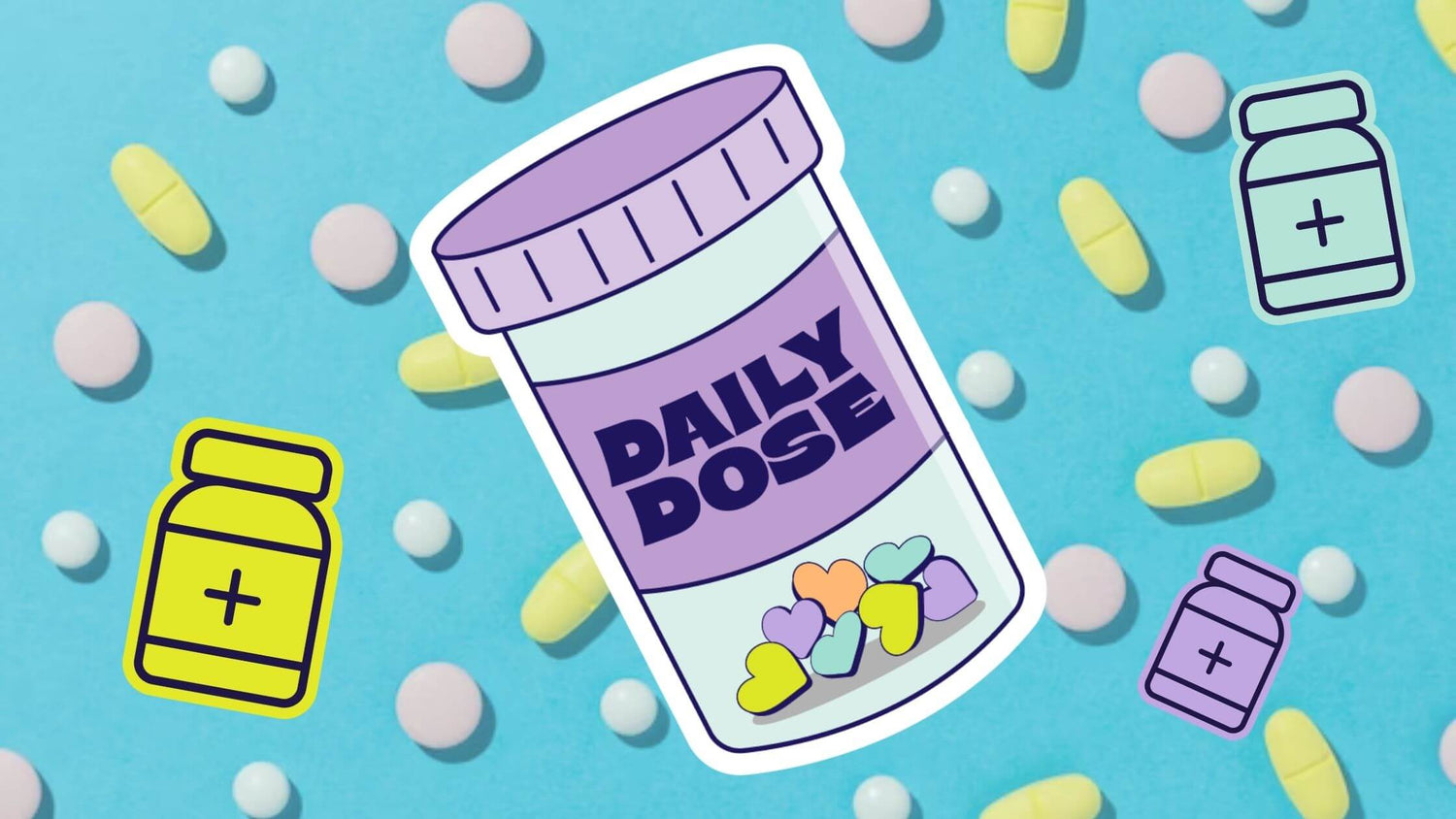You might have heard the terms probiotics or probiotic bacteria before. It seems that they’re buzzwords in the modern-day health and wellness space and are often recommended by registered dietitians and qualified health professional. These terms are especially common when talking about gut health because that’s where they have their beneficial effects on the body.
Even if you’ve heard the terms, you might not know exactly what probiotics are, what they do, or their benefits. If so, you’ll know the answers to all of these by the end of this article.
We’re going to discuss what probiotics are, the main probiotic strains that can benefit your health, why they’re beneficial, and who might benefit the most from taking a daily probiotic supplement. We’ll pay particular attention to the positive effects of probiotics for those with irritable bowel syndrome (IBS).
What Are Probiotics?
Probiotics are what we like to call the superhumans of the bacterial kingdom. The term probiotics refers to certain species of bacteria that are known for being extra beneficial for human health. The word ‘probiotic’ is derived from the Greek words for ‘pro’ (promote) and ‘biotic’ (life), so the term literally means ‘promoting life’.
There’s been lots of research about probiotics in the past decade or so. More scientists and health experts are recognising the amazing benefits that probiotics have for the human body and are actively trying to learn more about these special species of bacteria.
Research is still ongoing, and scientists are discovering new things about probiotics and adjusting their recommendations about taking probiotic supplements all the time. We’re excited to see where the research takes us and what scientists will discover in the next decade (we hope you’re just as excited as us!).
Probiotic bacteria play a vital role in a number of digestive functions, including the breakdown of certain foods, the production of some vitamins and short-chain fatty acids, and gut motility. These tiny microorganisms live naturally in your gut in their millions, but you can take probiotic supplements to support your natural gut bacteria in their functions.
Probiotic supplements are especially beneficial if you’re dealing with gut dysbiosis, where the levels of good bacteria have been reduced, and the potentially harmful bacteria are thriving. Enhancing the number of probiotic bacterial species in your gut can restore a nice balance in your intestines and improve your digestive health.
Where Can You Find Probiotic Bacteria?
You’ll find probiotic supplements and supplements with digestive enzymes in most health stores. You can also get them from online retailers, and there is definitely no shortage of products out there.
Our probiotic supplement, aptly named A Dose For Bloating, was designed to help our customers tackle bloating, gas, and other pesky digestive symptoms. With a blend of probiotics, digestive enzymes, and plant extracts, you won’t find a more convenient and effective supplement out there!
Of course, supplements aren't for everybody. You might hate swallowing capsules or prefer to get things from foods and foods only. If so, you will be glad to hear that you can find probiotic bacteria in a wide range of foods and drinks.
Probiotic-rich foods and drinks include:
- Sauerkraut
- Yoghurt
- Kefir
- Tempeh and tofu
- Miso
- Pickles
- Natto
- Kombucha
What Is IBS?
You might wonder why we’re steering from probiotics to IBS, but these two subjects are closely related. Probiotics support your digestive system, and IBS is one of the most common digestive health issues in the world.
Irritable bowel syndrome affects around one in every five people globally, although the exact numbers can vary drastically across different countries. It’s a digestive condition that causes the smooth muscle of the lower digestive tract to contract more than it normally would after food has been ingested, leading to a range of negative symptoms.
General IBS diagnoses can be split into three main types - IBS-D, which means you experience mostly diarrhoea, IBS-C, where you’re mostly affected by constipation, and IBS-M, which involves a combination of both diarrhoea and constipation. However, for the most part, doctors will just refer to the condition as IBS and won’t always specify the exact category.
You can develop irritable bowel syndrome due to a number of different things, with some of the main causal factors including:
- Reduced gastrointestinal motility, causing the smooth muscle in the intestines to contract less efficiently and food to move more slowly through the gastrointestinal tract.
- Gut dysbiosis, leading to fewer beneficial bacteria and more pathogenic (harmful) bacteria in your gut microbiome
- Inflammation in the lower digestive tract, particularly in the gut mucosa (the lining of the gut)
- Increased gut sensitivity to certain foods
- Hormonal imbalances (especially imbalances in the thyroid hormones (T3 and T4), reproductive hormones (oestrogen and progesterone), or stress hormones (cortisol and adrenaline))
IBS affects people differently, and many of its symptoms overlap with the symptoms of other digestive health issues. This can make diagnosing irritable bowel syndrome tough. However, if you meet the following three points, you could be handed a lovely diagnosis of IBS from your doctor:
- You have had abdominal pain or discomfort for at least six months
- Your bowel habits have changed to either more diarrhoea or constipation over the last six months
- You’re getting a lot of abdominal bloating and associated cramps and pains
If you’ve been to your doctor with each of these symptoms and walked out of the consultation with a differential diagnosis of irritable bowel syndrome, your doctor might request some investigations to confirm IBS and figure out its cause. They might also request further investigations to rule out other possible diagnoses, especially the more serious ones.
If you complain of rectal bleeding, rapid and unintentional weight loss, or a family history of inflammatory bowel disease or coeliac disease, there could be something more serious than IBS going on in your gut. Scans, blood tests, and other gastrointestinal investigations can identify whether there’s something sinister causing your symptoms.
What Are the Best Probiotic Strains for IBS?
If you get an IBS diagnosis, your doctor might refer you to a specialist (such as a gastroenterologist, registered dietitian, or IBS specialist nurse). You may be offered medications to help control your condition and reduce your symptoms. Alongside conventional medicines, your allocated healthcare professional might recommend that you take a probiotic supplement each day as a natural remedy to promote better gut health.
The question is, which are the best probiotic strains of bacteria to tackle IBS and its associated symptoms? Of course, this is something that your doctor, registered dietitian, or nurse can advise you on, but we’re going to cover this topic here, too.
Clinical studies and research have shown that the best probiotic strains for those with irritable bowel syndrome include:
These are the most studied probiotic bacteria for general IBS without specifying the type (IBS-D, IBS-C, or IBS-M). However, some probiotic bacterial species and strains may be especially beneficial for each subcategory of irritable bowel syndrome.
The best probiotic bacterial strains for IBS-D
If you tend towards diarrhoea and soft motions with your IBS, you might find that probiotic supplements containing Saccharomyces boulardii (a type of yeast) are the most effective for you.
Studies have shown that this probiotic species can significantly reduce abdominal pain and the frequency of bowel movements in those with IBS-D. Aim to consume a probiotic that contains Saccharomyces boulardii alongside probiotic bacteria (such as Lactobaccilus plantarum Lp299v) to maximise the effectiveness of your supplement.
The best probiotic bacterial strains for IBS-C
If you have IBS-C and struggle with toilet regularity, research suggests that Bifidobacterium lactis BB-12 and Bifidobacterium lactis HN019 are your best choices. These probiotic bacterial species can stick around in the colon and promote the movement of food through your digestive tract to relieve constipation.
The best probiotic bacterial strains for IBS-M
If your bowels swing between diarrhoea and constipation, you’re best choosing a probiotic supplement that has a range of multiple probiotic bacterial species, including Lactobacillus acidophilus NCFM and Bifidobacterium lactis Bi-07, two probiotics that have been shown to relieve IBS-related bloating, abdominal cramping, and abdominal distension (swelling).
The Perfect All-Round Probiotic Supplement for IBS
If you’re feeling overwhelmed with the endless number of probiotic products that are available on the market nowadays, we’ve got your back! Our amazing team at Wild Dose have formulated the perfect probiotic for targeting the common symptoms of irritable bowel syndrome like bloating, gas, and abdominal cramps.
Taking just two capsules of our probiotic supplement, A Dose For Bloating, before or after eating your main meals can reduce the risk of bloating and sluggishness. It contains two billion probiotics (yes, billion!), seven digestive enzymes, and seven different plant extracts, each of which can promote better gut health.
More specifically, A Dose For Bloating contains a probiotic blend of Lactobacillus acidophilus and three strains of Bifidobacterium. Due to this unique blend, our supplement will be beneficial for you whether you have IBS that tends towards diarrhoea or constipation or if you suffer from IBS-M.
Have you got some questions about A Dose For Bloating? We would love to answer them! Get in touch with our friendly team by contacting us through our website so we can answer your burning questions and ensure that our probiotic supplement is ideal for your unique needs.









